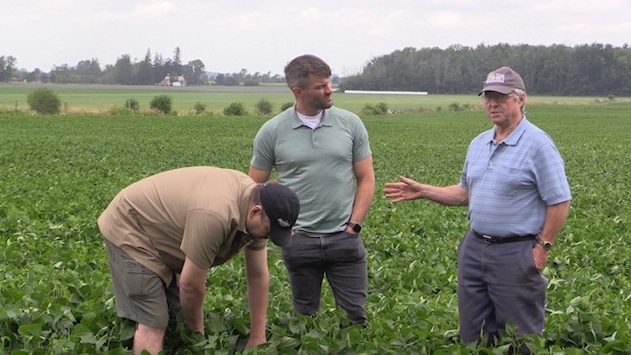Ontario bean growers say 35 per cent tariff on Russian fertilizer will hurt consumers
The beans in Jamie Payton’s field look fantastic, but he can’t help but feel sour about this growing season, thanks to a recent decision by the federal government.
“If they simply reverse this decision, and rescind it, I think a lot of people would have more respect for the federal government, realizing we all make mistakes,” says Payton, a St. Marys area bean producer, and vice-chair of the Ontario Bean Growers.
A 35 per cent tariff placed on Russian-made fertilizer by the federal government, has caught the ire of Ontario crop farmers. They understand the logic of penalizing Putin’s regime for his war on Ukraine, but say placing this tariff on this fertilizer doesn’t impact Russia at all, it only hurts Ontario farmers and consumers.
“This isn’t like we’re buying Russian fertilizer after they went to war with Ukraine. This was a deal that was already done. The ink was dry. Putin had his money. It was just a matter of waiting for the boats to load,” says Chair of the Ontario Bean Growers, David Woods.
Woods says the 35 per cent tariff on fertilizer that’s largely already on Ontario fields growing Ontario beans, wheat, corn and canola will ultimately lead to higher food prices.
“It’s a $60 million tax that’s going to filter down to the consumers, at the end of the day,” says Woods.
 Ontario Bean Growers, David Woods, Ryan Koeslag, and Jamie Payton discussa 35 per cent fertilizer tariff in a bean field near St. Marys, Ont. on July 29, 2022. (Scott Miller/CTV News London)
Ontario Bean Growers, David Woods, Ryan Koeslag, and Jamie Payton discussa 35 per cent fertilizer tariff in a bean field near St. Marys, Ont. on July 29, 2022. (Scott Miller/CTV News London)
Canada is the only G7 nation that hasn’t exempted fertilizer from their Russian sanctions. Canada, also just came forward with a plan to force Canadian farmers to cut fertilizer use by 30 per cent by 2030, in order to curb greenhouse gas emissions.
“The U.S has totally exempted their producers from this, so it’s very frustrating because how do we now compete, globally,” says Payton.
The Ontario Bean Growers say there isn’t enough cattle manure in the province to fertilize their crops, so the fertilizer is necessary, and Russia is the world’s largest producer of it.
“Why not make it here, and then we’re isolated from these kinds of things in the future,” suggests Woods, who would like to see the fertilizer tariff money used to fund Canadian fertilizer plants.
When Payton’s beans come off the field this fall, they’ll likely be some of the most expensive beans this field has ever produced, with a limited export market. Woods says the Canadian government’s 35 per cent fertilizer tariff will be entirely to blame.
“It’s a retroactive tariff, that does no good to help, anyone,” says Woods.
CTVNews.ca Top Stories

'She will not be missed': Trump on Freeland's departure from cabinet
As Canadians watched a day of considerable political turmoil for Prime Minister Justin Trudeau and his government given the sudden departure of Chrystia Freeland on Monday, it appears that U.S. president-elect Donald Trump was also watching it unfold.
Canadian government to make border security announcement today: sources
The federal government will make an announcement on new border security measures after question today, CTV News has learned.
Two employees charged in death of assisted care resident who ended up locked outside building overnight
Two employees at an Oshawa assisted living facility are facing charges in connection with the death of a resident who wandered outside the building during the winter and ended up locked outside all night.
The Canada Post strike is over, but it will take time to get back to normal, says spokesperson
Canada Post workers are back on the job after a gruelling four-week strike that halted deliveries across the country, but it could take time before operations are back to normal.
Lion Electric to file for creditor protection
Lion Electric, a Quebec-based manufacturer of electric buses and trucks, says that it plans to file for creditor protection.
Canada's inflation rate down a tick to 1.9% in November
Inflation edged down slightly to 1.9 per cent in November as price growth continued to stabilize in Canada.
Transit riders work together to rescue scared cat from underneath TTC streetcar
A group of TTC riders banded together to rescue a woman's cat from underneath a streetcar in downtown Toronto, saving one of its nine lives.
Trudeau considering his options as leader after Freeland quits cabinet, sources say
Chrystia Freeland, Canada's finance minister, said in an explosive letter published Monday morning that she will quit cabinet. Here's what happened on Monday, Dec. 16.
Teacher and a teenage student killed in a shooting at a Christian school in Wisconsin
A 15-year-old student killed a teacher and another teenager with a handgun Monday at a Christian school in Wisconsin, terrifying classmates including a second grader who made the 911 call that sent dozens of police officers rushing to the small school just a week before its Christmas break.


































